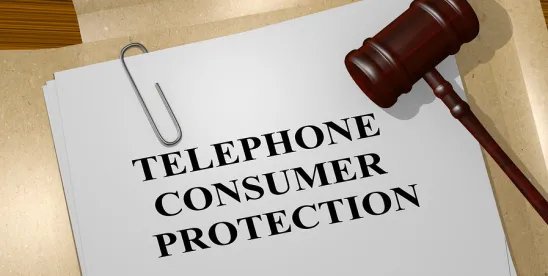As all of us TCPA enthusiasts know, a cornerstone issue in many TCPA cases is whether plaintiff has provided consent to be contacted and whether that consent can be revoked. According to the Second Circuit’s decision in Reyes v. Lincoln Auto. Fin. Servs., 861 F.3d 51, 56 (2d Cir. 2017), a consumer cannot unilaterally revoke consent to be contacted when it is provided in a legally binding contract. A number of courts across the nation have sided with Reyes in prominently defendant-friendly rulings. And now, we have the very first case out of the Ninth Circuit weighing in on the issue - squarely rejecting Reyes.
In Singer v. Las Vegas Ath. Clubs, No. 2:17-cv-01115-GMN-VCF, 2019 U.S. Dist. LEXIS 48838 (D. Nev. March 25, 2019), the court granted Plaintiff’s motion for summary judgment on grounds that the contract he signed did not preclude him from revoking his consent. In reaching this decision, the court declined to follow Reyes. Instead, the court found that the Ninth Circuit is bound by the decision in Van Patten v. Vertical Fitness Grp., LLC, 847 F.3d 1037, 1048 (9th Cir. 2017) which stands for the proposition that the TCPA permits consumers to revoke their prior express consent to be contacted with an ATDS. Defendant attempted to argue that the Reyes Court had the right approach because it is based upon "generally-accepted contractual common law.” The court, however, rejected this argument and deemed it “immaterial” because it found the 2015 FCC Order explicitly set forth a statutory, rather than common law, right of revocation.
Once the court found that the Plaintiff’s contract did not restrict his ability to revoke consent, it went on to grant summary judgment in Plaintiff’s favor based on the finding that no reasonable jury could conclude based on the undisputed evidence that Plaintiff’s had expressed anything other than a clear request that Defendant stop calling him. Specifically, the court was presented with evidence of a call recording during which Plaintiff stated “I’ve asked you guys to stop calling me. I don’t have the money,” in addition to a system note by the agent that stated “SD DONT HAVE THE MONEY…STOP CALLING.” The court found that the recording, combined with the agent’s understanding of the Plaintiff’s request as stated in the system notes left no room for debate over whether Plaintiff had revoked his consent to be called.
In addition to addressing the Reyes issue, the court in Singer also granted summary judgment on behalf of the Plaintiff on grounds that Defendant’s dialing system constituted an ATDS. In reaching its holding, the court followed the Ninth Circuit’s decision in Marks v. Crunch San Diego, LLC, 904 F.3d 1041, 1043-47 (9th Cir. 2018) and found that an ATDS "means equipment which has the capacity—(1) to store numbers to be called or (2) to produce numbers to be called, using a random or sequential number generator—and to dial such numbers automatically (even if the system must be turned on or triggered by a person)." Here, the evidence demonstrated that Defendant’s dialing system had the present capacity to store numbers to be called, and to dial such numbers. This was ultimately an unsurprising result since the court was within the Ninth Circuit, and bound to follow the definition of an ATDS set forth in Marks.
Singer touches on several hot-button TCPA issues, and is a reminder that most TCPA cases come down to basic factual disputes over consent and revocation. While decisions like Reyes are helpful legal arrows in a defendant’s quiver, the application of Reyes—particularly outside of the Second Circuit—is ultimately a gamble, and one that might be becoming less of a good bet given this seeming trend amongst lower courts declining to follow the holding.



 />i
/>i

